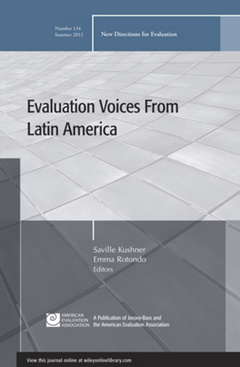Evaluation in latin america, 134 (series: j-b pe single issue (program) evaluation) (paperback) New Directions for Evaluation, Number 134 J–B PE Single Issue (Program) Evaluation Series, Vol. 109
Coordonnateurs : Kushner Saville, Rotondo Emma

Hear from evaluation practitioners throughout Latin America. In this region program evaluation is an emergent practice, one that is shaped by distinctive geopolitical and social contexts and has its own intellectual biography.
Through a selection of writings and cases this issue provides a window on program evaluation in this region. The articles indicate a range of experiences and concerns that respond to the countries’ unique histories and cultures. Articles by evaluators from Argentina, Brazil, Chile, Colombia, Costa Rica, and Peru illustrate new directions and are grouped around the following themes:
- Strategic use of evaluation in public policies and active citizenship
- Innovative project evaluation examples
- Evaluation capacity building and institutionalization.
The widespread development of participatory or actor-oriented approaches, based on qualitative methodologies that have a particularly Latin American stamp, are emphasized in this issue.
This is the 134th volume of the Jossey-Bass quarterly report series New Directions for Evaluation, an official publication of the American Evaluation Association.
Saville Kushner, Emma Rotondo
1. Evaluation in Latin America: Paradigms and Practices 7
Nerio Neirotti
This chapter looks at the emergence and development of program evaluation through successive waves of political and economic reform across Latin America, including the imposition and withdrawal of the Washington Consensus.
2. Emergent Evaluation and Educational Reforms in Latin America 17
Sergio Martinic
This chapter has a particular focus on educational evaluation. The author shows how the discipline and methodology of evaluation has changed in response to waves of school reform in the region.
3. Evaluation, Public Policies, and Human Rights 29
Ludwig Guendel
Continuing the theme of evaluation in Latin America responding to sociopolitical contexts, this chapter focuses on how evaluation reflects international policy for human rights. The author looks at how the rights agenda is written into policy and the essential acknowledgment of subjectivities.
4. Moving Toward a Gender Equality and Human Rights Perspective in Evaluation 39
Alejandra Faúndez Meléndez
Gender and equity issues are not uncommon themes in evaluation discourse, but in this chapter we hear about how they are played out in the context of Latin America. The place of the woman in development and the particular cases of indigenous peoples provide some of the context.
5. Youth Participation in Evaluation: The Pró-Menino Program in Brazil 49
Daniel Braga Brandão, Rogério Renato Silva, Renata Codas
Focusing at the level of method, this chapter looks at a case of a participatory evaluation with adolescents, and the use of comic-book-type storyboarding as an evaluative tool.
6. Evaluating With At-Risk Communities: Learning From a Social Program in a Brazilian Slum 61
Ana Carolina Letichevsky, Thereza Penna Firme
In this chapter, the authors give an account of an evaluation conducted as "appreciative enquiry" in collaboration with a community in a poor area. "Appreciation" was a methodological response to previously failed attempts to secure the trust of this community.
7. Performance Measurement and Evaluation Systems: Institutionalizing Accountability for Governmental Results in Latin America 77
Nuria Cunill-Grau, Sonia M. Ospina
Returning to the opening themes of how evaluation responds to political and economic change, this chapter looks at the dominant international methodology of results-based management and raises issue for the practice of evaluation in Latin America.
8. Lessons Learned From Evaluation Capacity Building 93
Emma Rotondo
Struggling to meet contemporary innovation and reform demands capacity development for evaluation is a prominent dimension of experience in the region. This chapter documents the work of PREVAL, a UN-funded evaluation network dedicated to capacity development in qualitative approaches to program evaluation.
9. Evaluation as a Learning Tool 103
Osvaldo Néstor Feinstein
This chapter discusses the commonly-expressed dualism between evaluation for learning and evaluation for accountability. In a Latin American context, the author argues that the two can and should be seen as complementary.
INDEX 113
Saville Kushner and Emma Rotondo are the authors of Evaluation Voices from Latin America: New Directions for Evaluation, Number 134, published by Wiley.
Date de parution : 07-2012
14.9x22.7 cm
Disponible chez l'éditeur (délai d'approvisionnement : 12 jours).
Prix indicatif 31,03 €
Ajouter au panierThème d’Evaluation in latin america, 134 ... :
Mots-clés :
program; emergence; evaluation; latin america; imposition; consensus; washington; martinic; particular; latin; focus; sergio; america; reforms; educational; methodology; response; author; reform; school; discipline; waves; theme



